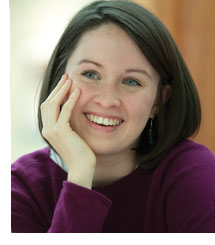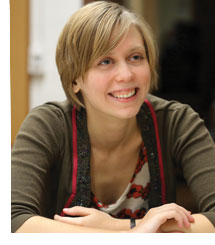Carlotta is coming! The annual festival of new plays by the three playwrights graduating from Yale School of Drama—this year, Hansol Jung, Mary Laws, Kate Tarker—opens next week, May 9th and continues till May 16th. The plays are directed by the three graduating directors whose thesis shows were staged earlier this school year: Cole Lewis, who directed Dürrenmatt’s The Visit, directs Jung’s Cardboard Piano, Katherine McGerr, who directed Ibsen’s Hedda Gabler, directs Laws’ Bird Fire Fly, and Dustin Wills, who directed Barrie’s Peter Pan, directs Tarker’s Thunderbodies.
According to Hansol Jung, the plays for this year’s Carlotta began as “Not-Carlotta Plays”—for their final play to be produced as students at YSD, all three playwrights returned, as chance would have it, to plays written in their second year for a workshop with Sarah Ruhl; at the time, none were consciously writing a play for Carlotta, nor felt the plays would eventually become their Carlotta plays. Working on the plays in such close proximity may have had its effect, however, as all three plays are concerned to some degree with war, and each features a soldier amongst its characters.
The inspiration for Jung’s play came from documentaries she had watched about “The Bang Bang Club”—a group of photographers who placed themselves in harms’ way to take hard-hitting photographs of parts of Africa facing war and famine. Jung also points to the viral online video about Joseph Kony and his depredations, involving child soldiers and other crimes against humanity. At the time when Carlotta proposals were due, Jung “had three plays, in various states of draft, on the table.” Director Lewis and dramaturg Whitney Dibo, Co-Artistic Director of Yale Cabaret 46, as well as faculty advisors, were unanimous in seeing Cardboard Piano as the play Jung should go with.
Jung says the play “gravitates toward trauma”; Cardboard Piano begins on New Year’s Eve, 2000, in a cathedral where two teen-aged girls, one the daughter of missionaries, have gone to unite themselves in marriage, only to be interrupted by child soldiers, hiding out. Part two opens, after an intermission, 14 years later as the girls, women now, return to the scene. For Jung, one challenge in writing the play is its strict adherence to “the unities” of time, place, and duration. Each part occurs in one location and in real time, offering “a day in the life” quality that should also resonate, in the second part, as a recognition scene with “super high stakes.” Large in scope and execution, the play retains something of the stagecraft minimalism that Jung prefers.
Jung worked as a director’s assistant in South Korea before coming to the States, where she received an MFA in Directing at Penn State before embarking on play-writing. She has done extensive work with musicals and always finds a place for song in her plays, but none so far have been musicals—though she is working on a musical side project at present. Her play’s title comes from a story told to calm one of the soldiers, and she finds in the image of a fragile, artful thing that can be destroyed but also restored a figure for the effect her play achieves.
Cardboard Piano plays Fri, 5/9; Mon, 5/12; Thurs, 5/15, at 8 p.m. and Wed, 5/14, at 2 p.m.
Mary Laws’ play Bird Fire Fly departs rather notably from the three unities. A short play in three parts, with a cast of three male actors, Bird Fire Fly’s tripartite title indicates the three distinct segments of the play, the 1st, “Bird,” depicting children, the 2nd, “Fire,” young adults, and “Fly,” soldiers.
“The three character names stay the same,” Laws says, though they are not the same people nor played, from section to section, by the same actor. The choice to avoid even the most basic unity of character identity was spurred by Laws’ interest in creating “a larger landscape less about individuals, and in following the arc of an experience.” The play, in her view, depends more on its poetry, its symbols and metaphors, rather than on static characterization. “There’s a contained story in each part, each a piece of the puzzle” that is the question of the whole play.
Of her plays that might have worked for Carlotta, Laws chose the one she wrote in the same workshop with Sarah Ruhl that spawned the other Carlotta plays this year. Laws finds the play well-suited to the Carlotta format, and is excited by her “last chance” at YSD to work with director Katherine McGerr. The violence in the play—Laws says her theme is “crushed innocence”—is necessary because, Laws says, the play treats “things that scare me and provoke questions I might not know how to ask in real life.” The presence of war in our time is one such frightening aspect of modern life, and Laws aims for a cathartic exploration of her theme, which may leave the audience somewhat troubled. Her second-year play, Blueberry Toast, was violent in a more satiric way, and—as directed by Dustin Wills—went for extremes of behavior.
Key to Bird Fire Fly is its tempo and rhythm, in Laws’ view of her work. And to achieve her ends she’s willing to take risks with the conventions. Educated at Baylor in Texas, her home state, Laws was encouraged by generous teachers to write plays and then worked for three years at the Rattlestick Playwrights Theater in New York to hone her craft further. She recently had the experience of seeing an early play of hers worked on in a drama class at Baylor and looks forward to the day when one of her plays will be given a full production in Texas, where theater, she says, is an important part of the local culture.
Bird Fire Fly plays Sat, 5/10, and Wed, 5/14, at 8 p.m., and Tues, 5/13, and Fri, 5/16, at 2 p.m.
Kate Tarker calls her play Thunderbodies “a fun play” and “a little war comedy.” Originating in the same workshop class with her Carlotta colleagues, the play received a reading with professional actors and was viewed by everyone as “clearly my breakthrough play.” The anarchic style of the play was nurtured by the Clown class Tarker took with Christopher Bayes, YSD’s master of extremely energetic comedy. At ninety minutes, Thunderbodies is “an epic one act” consisting of separate scenes that “come together at the end.” The approach is satiric, “topsy-turvy,” with “lots of physical comedy, body talk, and lower body energy.”
The play derives from both physical and intellectual inspirations. Written when, in fall of her 2nd year, she broke her foot, the play was influenced by an experience that, Tarker says, made her much more aware of her body and the physics of doing formerly simple tasks. At the same time she was reading M. M. Bakhtin’s study of Rabelais, in which Bakhtin formulates his ideas of the “carnivalesque” as a subversive force and the “grotesque body” as a means of liberating that force. Reading that work, Tarker says, gave her “more permission to create ravenous characters.” And to set her play in what she calls “the medieval now.”
With her background in visual art, Tarker comes to theater from a somewhat different perspective and says she likes to write about “outsiders looking in.” Her “origin story” as a playwright, she says, occurred when she went to an African chimpanzee sanctuary to work on a visual art project. For half of her time there, the art supplies did not arrive and so she spent a lot of time writing detailed journal entries. The act of writing took her toward other interests, such as the varied arts approach the Interlochen Arts Academy, her high school in Michigan, fostered. In addition to play-writing, while at Yale she directed a play by Phillip Howze at the Cabaret and acted in a show, The Most Beautiful Thing in the World, devised with Gabriel Levey, this past fall.
Thunderbodies plays Sun, May 11, Tues, May 13, and Fri, May 16, at 8 p.m., and Thurs, May 15, at 2 p.m.
This year’s Carlotta plays, while having in common, perhaps, a willingness to address the theme of war to provoke rawer or more visceral emotions from the viewer, take three decidedly different approaches to their themes and offer three unique theatrical experiences. The shows, besides adding to the challenging work of the three graduating directors, feature casts of first and second-year actors, many of whom have been seen in thesis shows or at the Cabaret, such as Celeste Arias, Aaron Bartz, James Cusati-Moyer, Melanie Field, Christopher Geary, Jonathan Majors, Julian Elijah Martinez, Yahya Abdul-Mateen II, Tom Pecinka, Bradley James Tejeda, Shaunette Renée Wilson.
Look forward to interesting offerings this year at the Carlotta Festival of New Plays.
The Carlotta Festival of New Plays Yale School of Drama May 9-May 16, 2014 The Iseman Theater 1156 Chapel Street
[Note: an earlier version of this article erred in the chronology of Kate Tarker's trip to the chimpanzee sanctuary (before college, not after), the location of her high school (Michigan not Colorado), and her studies at Reed (Literature-Theatre, not Visual Arts). Our apologies for any confusion.]


